

Boxer Rebellion. This is a historical article from an early issue of China Now magazine.
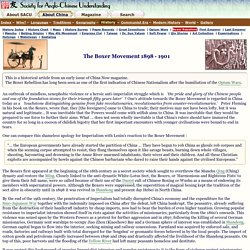
The Boxer Rebellion has long been seen as one of the first indication of Chinese Nationalism after the humiliation of the Opium Wars. An outbreak of mindless, xenophobic violence or a heroic anti-imperialist struggle which is 'the pride and glory of the Chinese people and one of the foundation stones for their triumph fifty years later'? One's attitude towards the Boxer Movement is regarded in China today as a 'touchstone distinguishing genuine from fake revolutionaries, revolutionaries from counter-revolutionaries.' Peter Fleming in his book on the Boxers, wrote that, they [the foreigners] came to China to trade; their motives may not have been lofty, but it was natural and legitimate… It was inevitable that the Powers would come with selfish aims to China.
It was inevitable that they would be prepared to use force to further their aims. Boxer Rebellion - The Boxer Rebellion. Boxer Rebellion - Summary: Beginning in 1899, the Boxer Rebellion was an uprising in China against foreign influence in religion, politics, and trade.
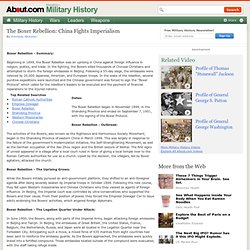
In the fighting, the Boxers killed thousands of Chinese Christians and attempted to storm the foreign embassies in Beijing. Following a 55-day siege, the embassies were relieved by 20,000 Japanese, American, and European troops. In the wake of the rebellion, several punitive expeditions were launched and the Chinese government was forced to sign the "Boxer Protocol" which called for the rebellion's leaders to be executed and the payment of financial reparations to the injured nations. Dates: Prologue: Selected Articles.
Winter 1999, Vol. 31, No. 4 U.S.
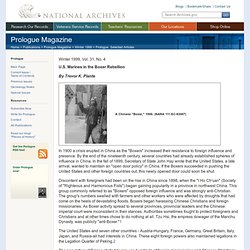
Marines in the Boxer Rebellion By Trevor K. Plante In 1900 a crisis erupted in China as the "Boxers" increased their resistance to foreign influence and presence. Discontent with foreigners had been on the rise in China since 1898, when the "I Ho Ch'uan" (Society of "Righteous and Harmonious Fists") began gaining popularity in a province in northwest China. The United States and seven other countries - Austria-Hungary, France, Germany, Great Britain, Italy, Japan, and Russia-all had interests in China. The population of Peking started to grow as hundreds of foreign missionaries and Chinese Christians began flocking to the city for protection.
On May 31, Capt. On June 18, foreign ministers in Peking received word from the Chinese government that a state of war would soon be in effect. Chinese artillery and small arms fire became constant. Captain Hall took command of the Legation Guard after Captain Myers was wounded. U.S. Boxer Rebellion, China Relief Expedition 1900. Frequently Asked Questions Related Resources: The origins of anti-Western attitudes in China are difficult to trace, but widespread dislike by the population at large goes back to at least the Opium War between Britain and China (1839-1842).
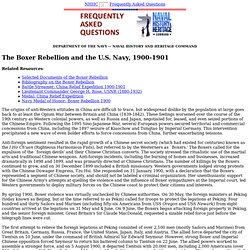
These feelings worsened over the course of the 19th century as Western colonial powers, as well as Russia and Japan, negotiated for, leased, and even seized portions of the Chinese Empire. Following the 1895 Sino-Japanese War, several European powers secured territorial and commercial concessions from China, including the 1897 seizure of Kiaochow and Tsingtao by Imperial Germany. This intervention precipitated a new wave of even bolder efforts to force concessions from China, further exacerbating tensions. Anti-foreign sentiment resulted in the rapid growth of a Chinese secret society (which had existed for centuries) known as the I Ho Ch'uan (Righteous Harmonious Fists), but referred to by the Westerners as `Boxers.'
The Boxer Rebellion, 1900. The Boxer rebellion in China in 1900 has many interesting parallels to events in the early 21st century.
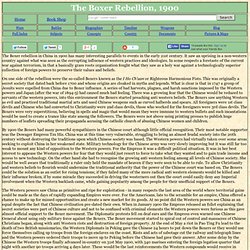
It saw an uprising in a non-western country against what was seen as the corrupting influence of western practices and ideologies. In some respects a foretaste of the current war against terrorism, in that a basically grass roots organisation fought what they saw as a holy war against a technologically superior collection of foreign powers to preserve their values and beliefs. On one side of the rebellion were the so-called Boxers known as the I Ho Ch’uan or Righteous Harmonious Fists. This was originally a secret society that dated back before 1700 and whose origins are cloaked in myths and legends. What is clear is that in 1747 a group of Jesuits were expelled from China due to Boxer influence.
By 1900 the Boxers had many powerful sympathizers in the Chinese court although little official recognition. Help - F.A.Q. - Contact Us - Search - Recent - About Us -